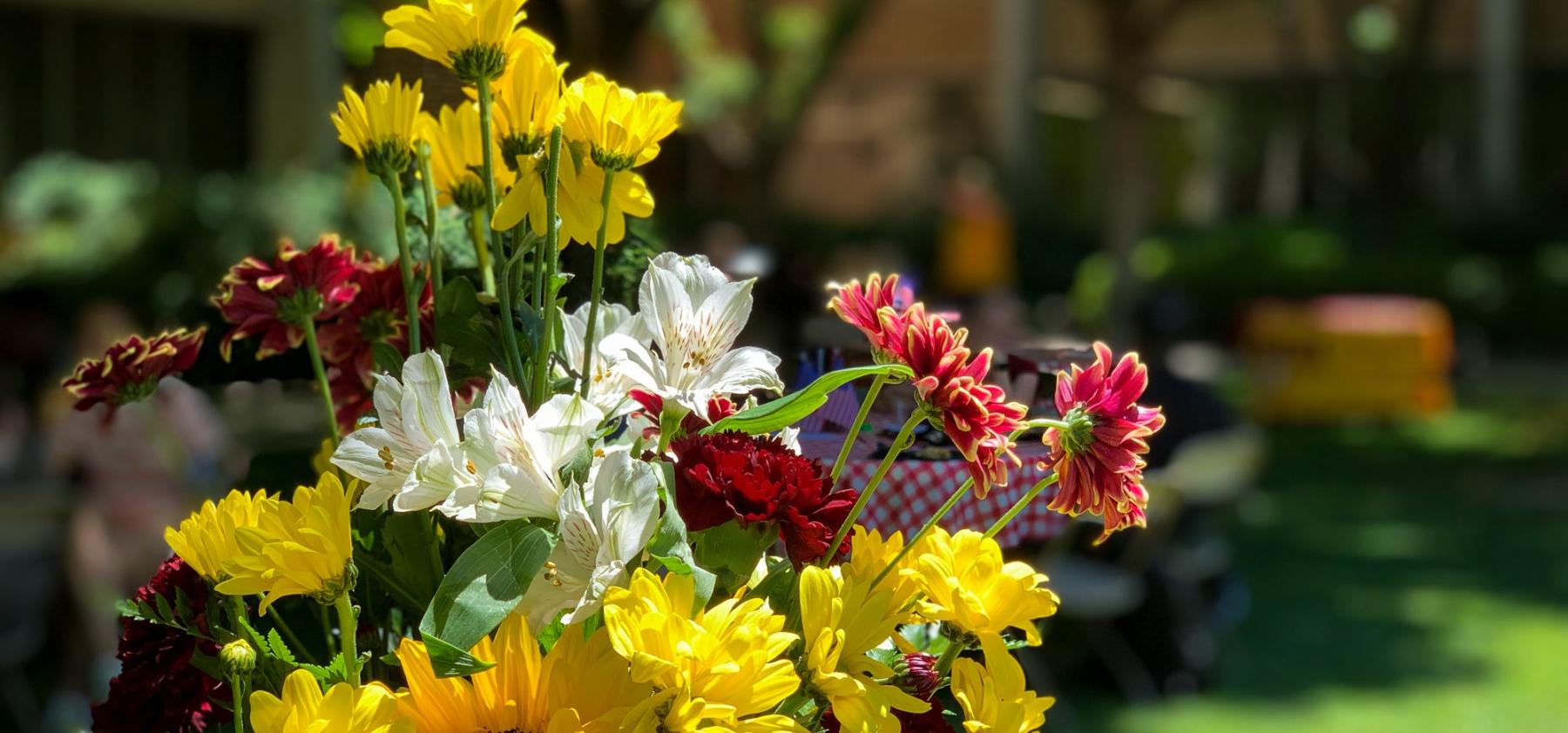
A picnic, writing camp and how to say no
All-American Picnic for all students
Hamburgers, apple pie, and baseball, oh my. The Grad College hosted an “All-American” Picnic for students in International Accelerated Degree Programs (IADPs) at ASU.
The picnic was a chance for IADP students and ASU staff and faculty to gather outside the classroom and celebrate their year.
Peggy Reid, who organized the event, said she wanted “to bring the students together again so they could reconnect,” since many of the students in different programs hadn’t seen each other since the welcome event at the beginning of the year.
At the picnic, students and staff alike played several rounds of baseball and badminton, while others chowed down on American cuisine, listening to classic American songs like “Route 66” by Nat King Cole.
Alberta Kwarteng, Asie Wadee, and Lois Andoh, all students from Ghana, sat together eating brownies and chatting. They study business and supply chain management.
“ASU is a diverse university,” said Asie Wadee. “I wanted to experience a different environment with different people and different cultures in school in order to make a global impact.”
Both Kwarteng and Andoh agreed. “I was really impressed by that,” Andoh said of ASU’s diverse people and programs.
IADP students uniquely represent our global engagement efforts. ASU and its partner universities offer IADPs to highly -qualified students as an opportunity to combine completing a degree from their home university with earning a master’s degree from ASU at an accelerated pace.
ASU currently has partnerships with universities from ten 10 countries. Eight ASU schools support IADP students.
A handful of the IADP students are graduating this May. The Graduate College congratulates them and wishes them well in their next endeavors.
Writing Centers in University Academic Success Programs
The Writing Centers in University Academic Success Programs (UASP) at ASU is offering three summer graduate writing camps this June to help students navigate the demands of graduate-level writing.
Doctoral students who have reached candidacy or who are currently writing their dissertation prospectuses are eligible to register for either of the two Dissertation Writing camps:
-
Online Dissertation Writing Camp: June 3 to June 7, 2019
-
Contact: Jessica Jones — [email protected] 480-965-7309
-
Tempe Dissertation Writing Camp: June 17 to June 21, 2019
-
Contact: Darby Simpson — [email protected] 480-965-4062
The Success in Graduate Writing camp is an interactive series of instructional sessions for developing and enhancing academic writing and research skills. Graduate students enrolled in any ASU graduate certificate, master’s degree or doctoral degree program are eligible to attend.
-
June 10 to June 14, 2019, at the Downtown Phoenix campus
-
Contact: Nathan Cushing — [email protected] 602-496-0364
Mindfulness and Mental Health
I know as graduate students you lead busy lives, balancing a variety of demands. As you wind down from another semester, it can be difficult to carve out time to take care of yourself amid the multitude of other obligations. It is important to take some time for yourself and self-reflect on how to improve your wellness. How do you prioritize yourself and make time for the things that you know will help you succeed (e.g., eating well, sleeping adequately, exercising regularly and spending time with family and friends)? It may be as simple as saying no.
Yes, say no more often. To do this, you must first analyze the many ways that you say yes to nonessential requests. Many of us want to be friendly or helpful and deliver when someone asks us to do something; however, we may be ceding precious time that could be reallocated to activities that will help ground and strengthen us. It only takes a few moments to breathe deeply and admire nature. A few more minutes to engage in a hobby that energizes you. Without setting boundaries and protecting your time, the opportunities to connect with yourself and others diminish.
If saying no is difficult, it may be beneficial to explore the hesitation. Do you want to be all things to all people? Do you feel a sense of guilt? Do you wonder what others will think if you are not at a particular event? So many reasons may explain a reluctance to say no. Until comfortable or confident with no, start with responses like “maybe” or “perhaps.” It could be more natural and honest to say that you will need to check your calendar or consult with a family member before answering. These responses create space while you decide if the yes is worth the offset of your time and energy.
Once you decide to say yes, I recommend that you invest fully in the activity that you have chosen without worry about what else you should be doing in that moment. Sometimes, we reference this as being present. If you find that you cannot be present, then it might call to question whether this activity should be re-evaluated for its purpose and priority. Or, you may want to learn more about being in the present moment through practices like mindfulness. Regardless of how you choose to spend your time, I hope that you will say no to some things in order to say yes to yourself or the things and people that you love.
Joanne Vogel, Ph.D.
Deputy Vice President/Dean of Students
Educational Outreach & Student Services
More stories from the Graduate Insider

Graduate funding deadlines for Fall

Witches worldwide, literature and mental health: A conversation with Ana Silvia Cervantes Figueroa

How to feel confident in your next interview
Let’s be honest, interviews can feel nerve-wracking. Your palms sweat, your heart races, and you start to second-guess whether you even remember your own name. But here’s the good news: with a little preparation, you can walk into (or log onto) your next interview feeling calm, collected, and ready to shine.